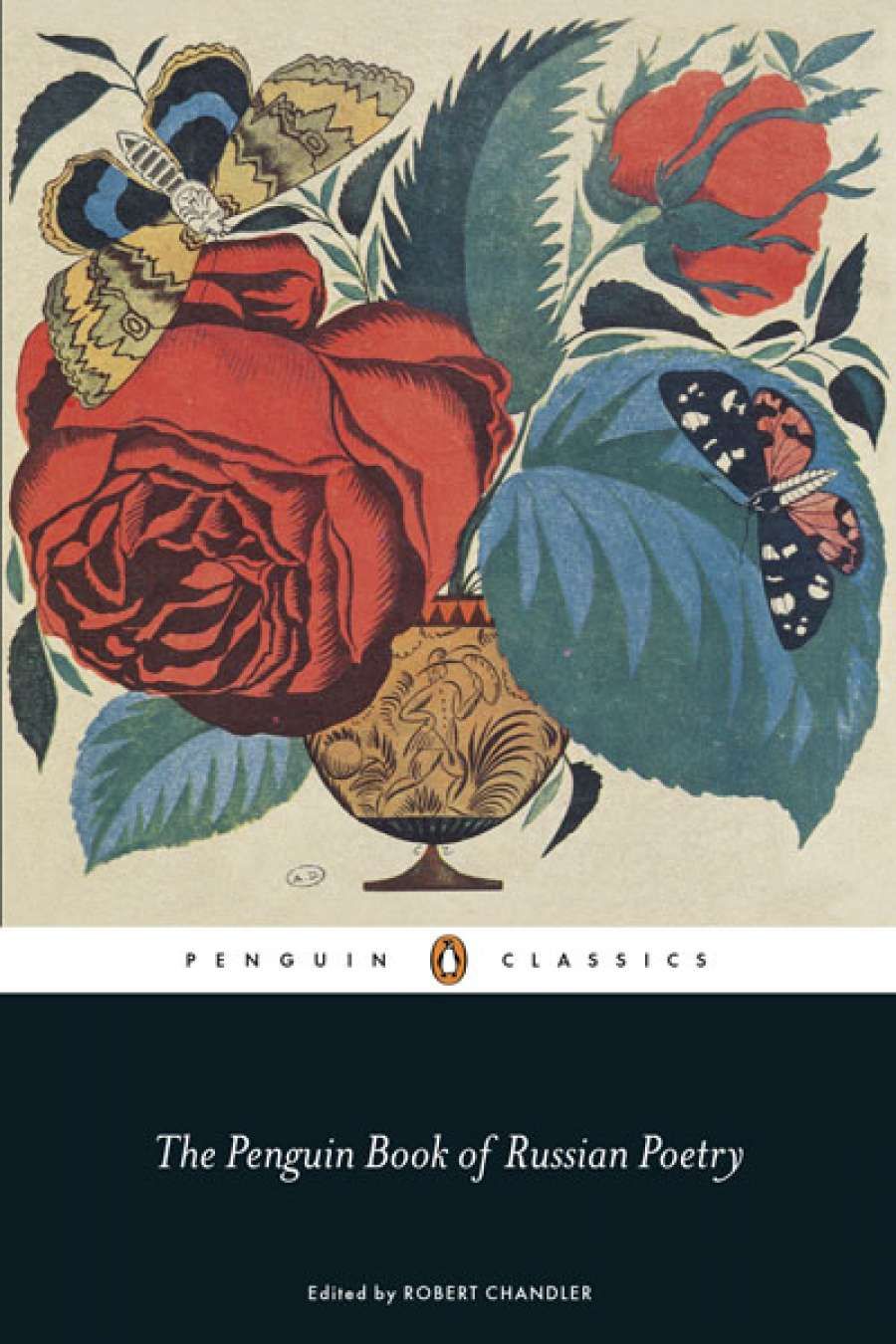
- Free Article: No
- Contents Category: Poetry
- Custom Article Title: David Wells reviews 'The Penguin Book of Russian Poetry' edited by Robert Chandler, Boris Dralyuk, and Irina Mashinski
- Review Article: Yes
- Online Only: No
- Book 1 Title: The Penguin Book of Russian Poetry
- Book 1 Biblio: Penguin Books, $22.99 pb, 591 pp, 9780141198309
Not surprisingly, the poet who is given the most space and who dominates the book's structure is Alexander Pushkin (1799–1837). It might not be possible to recreate in English the special resonance that Pushkin has for readers of Russian as the 'national' poet. However, this selection gives a convincing impression of his genius and versatility, embracing short love lyrics, epigrams, and longer reflective poems like 'Autumn', as well as verse drama and narrative verse – longer forms in which Pushkin excelled. Some of the longer works are represented by extracts, but The Bronze Horseman, admirably translated by Stanley Mitchell and Antony Wood, is given whole, allowing the full scope of Pushkin's vision to be seen. Evgeny Onegin, on the other hand, is unaccountably absent, even in part.
Before Pushkin comes a section on the 'Eighteenth Century'. Although this was an important period in the development of the Russian literary language, its poetry for the most part now has little appeal except to specialists. Two examples are presented here: the odic grandeur of Gavrila Derzhavin and, by contrast, the satire of Ivan Krylov, whose adaptations of La Fontaine's fables are rendered into vibrant English in the versions of Gordon Pirie. 'Around Pushkin' provides a selection of Pushkin's contemporaries, showing that he did not exist in a vacuum, but in fact belonged to an eloquent and spirited poetic community that constituted the Russian 'Golden Age'. Poetry in the second half of the nineteenth century was overshadowed by the rapid development of prose, but the lyric tradition continued and we are given a sample of its best writers under the heading 'After Pushkin'.
'The collection's clear focus is on celebrating Russian poetry as a literary form'
By far the largest section of the anthology, some 350 pages, is devoted to the 'Twentieth Century', which presents poets in chronological order of their birth, from the symbolist Innokenty Annensky (1855) to Joseph Brodsky (1940). Bringing twentieth-century poets together in this undifferentiated way avoids making a doubtful distinction among pre-revolutionary, Soviet, émigré and post-Soviet verse, but it also gives little guidance about schools and affiliations. Still, the main literary movements of the first half of the century (symbolism, futurism, acmeism, the quasi-surrealism of Nikolai Zabolotsky or Daniil Kharms) are well represented. Anna Akhmatova, Osip Mandelstam, Marina Tsvetaeva, and Boris Pasternak are given due attention, but are not allowed to dominate lesser-known but highly talented contemporaries like Vladislav Khodasevich and Georgy Ivanov. The later twentieth century, too, produced an extraordinary range of poets. In the selection here I was struck particularly by Lev Ozerov's poignant tributes to fellow writers, in translations by Robert Chandler and Boris Dralyuk.
 Portrait of Alexander Pushkin by Orest Kiprensky, 1827 (Tretyakov Gallery, Moscow, via Wikimedia Commons)
Portrait of Alexander Pushkin by Orest Kiprensky, 1827 (Tretyakov Gallery, Moscow, via Wikimedia Commons)
Living poets, apart from Evgeny Evtushenko (born 1932), and a handful of younger writers, have been omitted, on the grounds that they are better known from other recent anthologies. This is reasonable enough, especially as the intention appears to be to create something of a canon, but the omission of, for example, the St Petersburg poet Alexander Kushner (born 1936) is still striking.
As Chandler notes in his introduction, Russian poetry has largely eschewed the impetus towards free form that has influenced verse in the West European languages; it generally preserves a commitment to metre and rhyme. The translations, about twenty per cent of them by Robert Chandler himself, often try to reproduce at least something of the flavour of the originals in this respect. Unsurprisingly, this is more successful in some cases than in others, and the use of occasional or half rhyme in some poems is apt to convey an unintended indecisiveness. Nevertheless, often the impact of the translation is very close indeed to the impact of the original. The Penguin Book of Russian Poetry is a lively collection that will be a standard work for years to come.


Comments powered by CComment